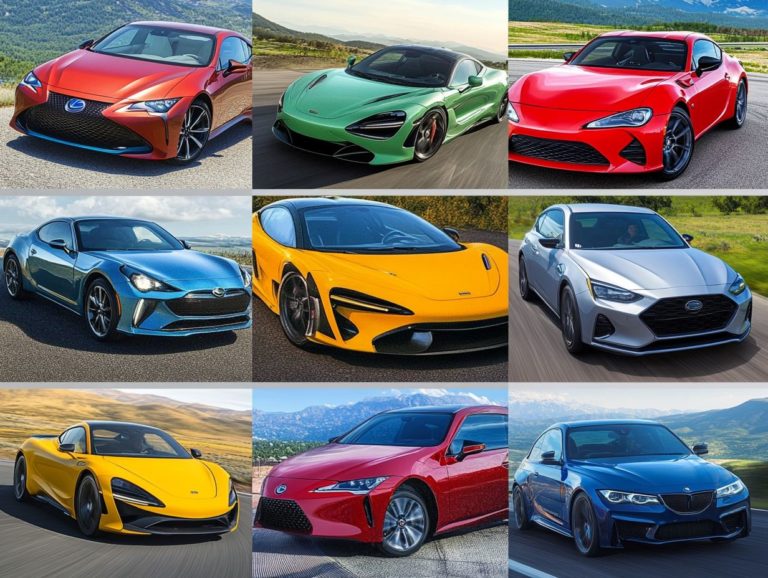How Price Influences Your Car Buying Decision
When you think about buying a car, price is likely the first consideration and quite rightly so. Understanding the factors that influence car prices can significantly impact your buying journey. Let’s dive in and discover how to navigate these waters wisely!
From the ebb and flow of supply and demand to the nuances of pricing strategies like MSRP (Manufacturer’s Suggested Retail Price) and dealer markups, every detail plays a crucial role. This guide will deftly navigate the pricing landscape, equipping you with tips on negotiation, hidden costs, and alternative buying options. Are you ready to learn how to get the best deal?
Whether you’re eyeing a brand-new model or weighing the merits of a used car, mastering the financial aspects can lead to a more intelligent and gratifying purchase.
Contents
- Key Takeaways:
- The Role of Price in Car Buying
- Factors that Affect Car Prices
- Understanding the Different Pricing Strategies
- How to Negotiate a Fair Price
- Additional Costs to Consider
- Alternative Options for Car Buying
- Frequently Asked Questions
- What factors should I consider when making a car buying decision?
- Does price always dictate the quality of a car?
- How can the price of a car influence my decision?
- Are there any hidden costs associated with buying a car?
- Is it worth negotiating the price of a car?
- What should I do if the price of a car is out of my budget?
Key Takeaways:

- The price of a car plays a significant role in the decision-making process.
- Supply and demand, brand and model, and features all impact car prices.
- Proper research and negotiation can help you secure a fair price.
The Role of Price in Car Buying
The role of price in car buying is absolutely pivotal, shaping not only your purchase decision but also your emotional connection to the vehicle you choose. Understanding how regional pricing affects car choices is essential in a landscape where a lower price often equates to perceived value, highlighting its influence on consumer behavior for both you and automotive marketers.
Elements like fuel efficiency, safety features, and driving comfort all intertwine with pricing, influencing your expectations and the overall dealership experience. As consumer preferences shift especially among Millennials and Baby Boomers automotive marketing strategies must evolve to ensure your satisfaction and loyalty.
Why Price Matters
Price plays a pivotal role in your car-buying journey, significantly shaping your behavior and emotional connection to vehicles.
As a potential buyer, you often find yourself navigating a maze of considerations, from initial costs to long-term financial commitments, which can stir a mix of feelings everything from excitement to anxiety. For example, when you contemplate the leap from a modest sedan to a luxury model, you might feel a surge of aspiration, yet also a twinge of apprehension regarding those monthly payments.
If you re working with a tighter budget, you may lean toward more affordable options, perhaps choosing a reliable used car over a shiny new model. This reflects a delicate balance between your desires and the financial realities you face.
Your lifestyle choices and preferences can change a lot based on the prices you encounter, directly influencing your purchasing decisions.
Factors that Affect Car Prices
Many factors influence car prices, from the intricate dance of supply and demand to the distinctive characteristics of specific brands and models.
The many features and options available to consumers also play a crucial role in determining the final cost.
Supply and Demand
The relationship between supply and demand is crucial in determining car prices. When demand surges amid limited supply, you’re likely to see prices rise.
In the automotive market, this principle becomes particularly clear during the launch of new models. Eager buyers often flock to dealerships, and this increased interest can drive demand up, prompting manufacturers to hike prices to take advantage of consumer enthusiasm.
On the flip side, if a model’s popularity fades or if there’s an oversupply like when last season’s models linger unsold dealers may need to roll out significant discounts to spark sales.
This ongoing balancing act between supply and demand not only influences pricing strategies but also shapes how you perceive value and quality in your automotive selections.
Brand and Model
The brand and model of a vehicle play crucial roles in its pricing. Certain brands command premium prices due to their perceived quality and reputation.
This market positioning is often the result of decades of meticulous branding, strategic advertising, and a consistent message that resonates deeply with consumers.
Take luxury brands, for example they cultivate devoted customer bases willing to pay a premium for the status their vehicles confer. This consumer loyalty not only guarantees a steady revenue stream but also grants these brands the upper hand in adjusting their pricing strategies.
After all, loyal customers tend to prioritize brand allegiance over mere cost.
In the automotive industry, smart marketing is paramount. The perceived value of a brand can significantly impact price points, enabling these brands to remain competitive while preserving their lucrative margins.
Features and Options

Vehicle features and options play a crucial role in determining car prices. Advanced safety systems and enhanced fuel efficiency often drive those price points higher.
These attributes go beyond mere frills; they reflect a rising consumer demand for smarter, safer driving experiences. As you gravitate toward models equipped with cutting-edge technology like adaptive cruise control or lane-keeping assist, you ll notice how this preference influences pricing structures across the market.
Comfort features, such as premium seating and advanced climate control systems, also significantly contribute to justifying those elevated costs. Eco-conscious buyers, in particular, are swayed by environmental attributes.
They favor hybrid or electric vehicles that, while they may come with higher initial price tags, promise long-term savings and a smaller carbon footprint.
In the end, you’re likely to invest more in features that enhance your overall driving experience and resonate with your personal values.
Understanding the Different Pricing Strategies
Grasping the various pricing strategies within the automotive market is crucial for you as a car buyer. This knowledge gives you the power to navigate the intricacies of MSRP (Manufacturer’s Suggested Retail Price), invoice price, and dealer markup with confidence and clarity.
MSRP vs. Invoice Price
The MSRP serves as your starting point when considering a vehicle. The invoice price reflects the actual amount the dealer pays to the manufacturer.
Grasping this distinction can significantly enhance your negotiating power, as you’ll understand the true costs that dealerships face. With this knowledge, you can walk into negotiations ready to pounce on the best deal!
Automotive marketing often spins these figures in a way that may mislead you, highlighting the MSRP while glossing over the invoice price. This strategic framing shapes perceptions and expectations.
It s essential for you to familiarize yourself with both prices. By doing so, you can dismantle marketing tactics and negotiate deals that genuinely reflect the true value of the vehicle you desire.
Dealer Markup
Dealer markup refers to an additional charge that dealerships impose on top of the invoice price. It can significantly influence the final amount you end up paying for your car.
This markup varies widely based on several factors, including the current demand for a specific model, the vehicle’s availability in the market, and the particular policies of the dealership.
During high-demand periods, be prepared for prices to rise sharply! Understanding consumer behavior is essential in this scenario.
Many individuals may find themselves reluctantly accepting these charges due to the urgency of securing a vehicle, while others actively seek ways to negotiate better terms.
Successfully navigating the markup often relies on thorough research, including price comparisons and awareness of available promotions. This knowledge gives you the power to challenge inflated prices and strive for a more equitable deal.
How to Negotiate a Fair Price
Negotiating a fair price when purchasing a car requires meticulous research and preparation on your part. By equipping yourself with knowledge, you can engage confidently with dealerships, positioning yourself to secure better deals that reflect your needs and budget.
Research and Preparation
Research and preparation are essential steps in your car-buying journey, giving you the power to make informed decisions grounded in thorough online exploration and dealership encounters.
Use websites like Autotrader and Kelley Blue Book. They help you research prices easily. These platforms enable you to compare vehicle prices, assess value, and analyze market trends, providing you with a solid foundation to navigate the automotive landscape effectively.
As you engage in detailed evaluations, you not only streamline your search for the perfect vehicle but also gain valuable insights into fair pricing and potential savings. This diligent research builds your confidence in your choices, leading to a more satisfying and successful car purchasing experience.
Tactics for Negotiating

Effective tactics for negotiating a fair price hinge on your understanding of how buyers usually behave when shopping and how to leverage that during the buying process. This insight allows you to tailor your approach, making your discussions more impactful.
Establishing a clear budget is essential; it creates a framework for your negotiations and helps you avoid the pitfalls of overspending. If you re ready to walk away from a deal, you signal that you know your worth.
Research plays a pivotal role in this endeavor. By utilizing data, you can strengthen your arguments and gain leverage, ultimately enhancing your overall position. Using these strategies will help you negotiate better deals, ensuring you secure the best possible deal.
Additional Costs to Consider
Did you know that the price of a car is just the beginning of your financial commitment? When you re considering the purchase of a car, it’s essential to factor in more than just the price tag. You’ll need to account for various additional costs, such as taxes and fees, insurance premiums, and ongoing maintenance expenses that come with ownership.
Each of these elements plays a crucial role in the overall investment you re making.
Taxes and Fees
Don t overlook taxes and fees they can add up quickly and impact your budget. Taxes and fees are essential costs you need to factor into your overall budget when buying a car, often adding a significant amount to the vehicle’s price tag.
These additional expenses typically include sales tax, which varies by state and can substantially affect your initial outlay. Registration fees are another necessary consideration, allowing you to legally operate your vehicle on public roads; these can fluctuate based on your car’s value and your location.
Don t forget about documentation fees, which cover the administrative costs that dealerships incur. While these fees are often negotiable, they can still add to your financial burden.
It’s important to understand these components as a potential buyer, as they influence not just your immediate expenses but also the long-term value of your purchase.
Insurance and Maintenance
Car insurance and maintenance are ongoing expenses that significantly contribute to your total cost of ownership, influencing your average monthly payments.
Understanding these costs is crucial, especially since they can vary dramatically based on specific vehicle attributes like make, model, and age. For instance, if you opt for a sportier car, you might face higher insurance premiums due to its perceived risk and performance capabilities. On the other hand, older models may lead to more frequent maintenance expenses.
Fuel efficiency is another critical factor; vehicles with better mileage can translate into substantial savings over time. Therefore, as a potential car buyer, it s essential to consider these elements for long-term budgeting. This way, you can make well-informed decisions that won’t unexpectedly strain your finances.
Alternative Options for Car Buying
When contemplating a car purchase, you have a range of appealing options at your fingertips. You can weigh the merits of leasing versus buying and decide between the allure of a brand-new vehicle or the value of a used one.
Each choice presents its own unique advantages and disadvantages, encouraging you to think about what aligns best with your needs and lifestyle.
Leasing vs. Buying
Leasing offers you the flexibility of lower monthly payments and the chance to drive a new vehicle every few years. On the other hand, buying grants you long-term ownership and equity.
This leasing flexibility can be particularly appealing if you enjoy having the latest models with cutting-edge technology but aren t keen on making a hefty upfront investment. However, it s essential to weigh the total costs associated with both options.
Leasing often comes with mileage restrictions and potential fees for wear and tear. Conversely, buying may require a higher initial monthly expenditure but ultimately leads to ownership that appreciates over time.
Understanding your lifestyle needs and financial situation will help you navigate this decision, guiding you toward the best choice whether you lean toward short-term flexibility or a long-term investment.
Used Cars vs. New Cars

The choice between used cars and new cars hinges on various factors such as your budget, the condition of the vehicle, and your personal preferences. It is crucial to weigh your options with care.
As you consider this important purchase, think about depreciation, which means the decrease in a car’s value over time. New vehicles tend to lose value much more rapidly than their used counterparts. Many buyers find this fact helpful, often nudging them towards opting for used models, which generally offer better resale value over time.
With a wide array of vehicles available in the used market, your options expand significantly, allowing you to discover models that may otherwise be out of reach among new offerings. Ultimately, these decisions not only reflect your financial strategies but also reveal your unique preferences and lifestyle needs, showcasing the modern consumer’s mindset.
Frequently Asked Questions
What factors should I consider when making a car buying decision?
- Price
- Your budget
- Type of car needed
- Your personal preferences
When deciding which car to purchase, the price is a major factor to consider.
Does price always dictate the quality of a car?
Not necessarily. While a higher price may indicate a higher quality car, it is important to research and compare different options to find the best value for your budget.
How can the price of a car influence my decision?
The price of a car can affect your decision in several ways. It may determine whether the car is within your budget, influence your perception of the car’s value, and impact the overall cost of ownership. To gain deeper insights, consider understanding price differences among car brands.
Yes, there can be hidden costs when buying a car, such as taxes, registration fees, and dealership fees. It is important to factor in these additional costs when considering the total price of a car.
Is it worth negotiating the price of a car?
Yes, it is always worth negotiating the price of a car. Many dealerships are open to negotiation, and you may be able to get a better deal by doing so.
What should I do if the price of a car is out of my budget?
If the price of a car is out of your budget, consider looking at different models or shopping for a used car. You can also try negotiating with the dealership or waiting for a sale or promotion.
Ready to buy your new car? Start your search today!





